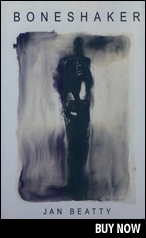        |


|
BONESHAKER
Boneshaker investigates the idea of the body as cultural machine, shelter, mirage, or home, as it asks the question: Is blood the answer to the question of one's history of longing? Are we to find our answers, our sense of place in history, through the transportation system of desire?
An intermittent motif of urban narratives shapes the body of Boneshaker. In "Machine Shop of Love," desire is called forth through the history of place in the form of "immigrant steelworkers" and rock & roll, arriving in the body of a woman. She's found a member of her "tribe," someone who hears on a cellular level the music that she knows to be her "lifesong," and she answers with sexuality. This poem sets the stage for a different kind of travel that informs all of Beatty's poems, whether it is these ancient city voices running through the body of the speaker, the voice of a dead father transporting her to safety, or check-out girls at the grocery urging her to new desire.
But is the body really all it's cracked up to be - why not just leave it, if only for a while? The title poem breathes a formal quality that Beatty so deftly uses to traverse these fractures. Clipped phrases, slashes, and sections take us to the soliloquy of a young girl learning her body and its place as cultural machine. An unexpected gift of the book occurs when this central speaker's power materializes in her choice of disintegration. Finally, Boneshaker challenges the protected icon of the mother's body in "Dear Mother, Machine," as Beatty rescripts the birth scene with girders and industrial pulleys.
There's yet another note in this lyrical book, embodied in "Aria for the Body" as we see the city of the womb, with a young girl architect designing her living quarters. One of the many surprises of Boneshaker is the wild girl fire that can't be contained as she comes out, screaming in the city of light.
'Wild girl fire' is what Jan Beatty calls it, 'that white-hot tearing' that ignites into art or self-destruction. Poetry against all odds. Poetry as the death-defying act. Poetry as the wild choice for a girl running reckless from the working class. Between odd jobs and odd loves, Beatty writes from the tender heart without flinching.
- Sandra Cisneros
This is slap in the face, wake the fuck up and smell the roses poetry. this is pay attention Bub, or you'll be in a jam poetry; poetry written in defiance of gravity and in the face of all the forces of our own desire that want to drag us down. And underneath all of this wildness is a true love and care for craft, and the anxious, bluesy rhythm of good talk, like a river.
- Bruce Weigl
What is the body? In Jan Beatty's courageous, beautiful, and harsh new
book, Boneshaker, the body is as horrifyingly without boundaries as the cosmos, as constricted as a prison cell. Language, too, is a body. At times it is stitched up tight in the strictures of narrative. At other times, chopped and opened up, not even a sentence survives intact. Restless with complacency and restriction, this book ricochets among a multitude of forms, tones, subjects. Boneshaker is a fierce, intelligent, terrifying interrogation of categories, among them the category of the book itself. Nothing is beyond the reach of this splendid new work./
- Lynn Emanuel
There is a school of poetry where the poems have content, where they communicate, where beauty is not forgotten. It is about work, family, and the lost towns. Grief. Jan is a central figure in this school.
- Gerald Stern
All work copyright © Jan Beatty 2024
|
|
|